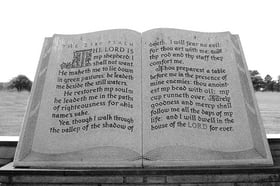Many years ago a woman in my ward asked me to explain the theology of the Left Behind series to her. She had heard about the books’ phenomenal popularity and wanted to be sure she understood what they were teaching about the end times – that some Christians would be spared the tribulation by being “raptured” to heaven before the anti-Christ unleashed seven crappy years of terror. I sketched this out for her and also touched on the mark of the beast, the battle of Armageddon, and the long awaited glorious appearing.

Her eyes got ever wider. “I just can’t get over the fact that people actually believe this stuff!” she exclaimed.
I’ve thought about this comment quite a bit over the years, and wish I had told her what I was thinking at that time: Mormons think evangelical theology is weird?
In our case, it’s not just that we believe (often literally) the miraculous tenets of a shared Christian faith: a virgin birth, a resurrection from the dead, a world-crushing flood. It’s that we’ve taken this corpus and added to it as only Mormons can.
Some of our own eschatological beliefs that are still on the books include:
- That a literal Adam and Eve inhabited and then were exiled from the Garden of Eden that was located not in some distant mythic place but in prosaic Jackson County, Missouri, which is close enough to Branson to catch a show;
- That after you’ve watched the show, you’ll be well placed for the apocalypse, because Jackson County will also be the exact site of Jesus’ return;
- That in the millennium, all things will be restored, including the seven continents being reunited to the single über-continent they are thought to have been before that pesky continental drift;
- That polygamy, while not practiced on earth at the moment, is God’s will and may well be the order of heaven;
- That we have a real-life, Old Testament style prophet walking the earth today, except he wears business suits instead of loincloths. He will guide us through the latter days.
Of these purported Mormon beliefs, I adhere to precisely one, and you can probably guess which one it is. Let’s just say I don’t plan to buy up property in Jackson County anytime soon.
I’ve been asked to lead a workshop in May on “the things I didn’t used to know about Mormonism” – in other words, those beliefs that someone mentioned offhandedly one day in Gospel Doctrine class, assuming that everyone else already knew about them. That is how I learned what “calling and election made sure” means, and that Mormons have fixed April 6 as Jesus’ birthday. In other words, it will be a workshop about the things that make converts and outsiders go, “Huh?”
The idea of the session is to give people a safe place in which to say, “And then I found out that I’m screwed forever if my husband forgets my temple name at the veil!” or “I never knew that we believed murderers won’t be able to attain the Celestial Kingdom even after they repent. I’m just not sure that’s what Jesus would say.” And the safety of this workshop will extend to participants being able to voice their disagreement or agreement with the beliefs they’ve highlighted.
I sometimes wish that the LDS Church provided a stronger sense of what Catholics call de fide, or “of the faith.” These are the beliefs that are absolutely central to the faith, without which you cannot consider yourself Catholic. For a Catholic, de fide means that you have to believe that the pope is holy, but you don’t necessarily have to believe that Saint Hedwig of Silesia levitated when she glimpsed the Eucharist. (That’s an awesome story, however.)
In Mormonism, the closest thing we have to de fide is the temple recommend interview, a very useful back-to-basics outline of core LDS beliefs and practices. If that’s our guideline, then if I believe in the tenets outlined there and submit to the accountability necessitated by those spiritual practices, then I need to work out the secondary and tertiary issues for myself.
I will take that to mean I’m free to disagree that Adam and Eve were literal people — let alone literal proto-Missourians.

